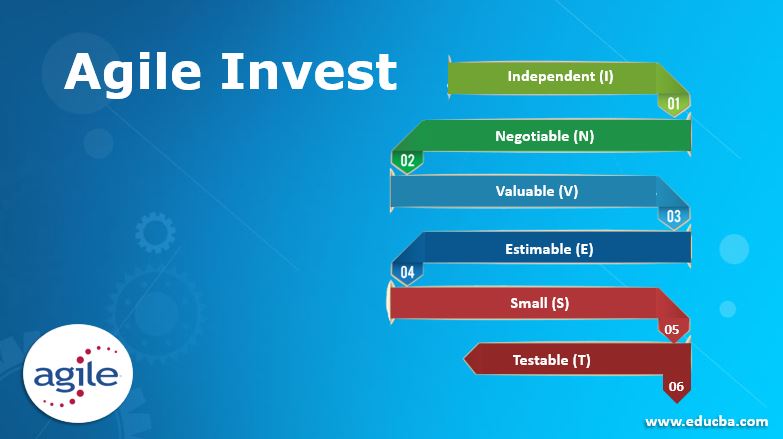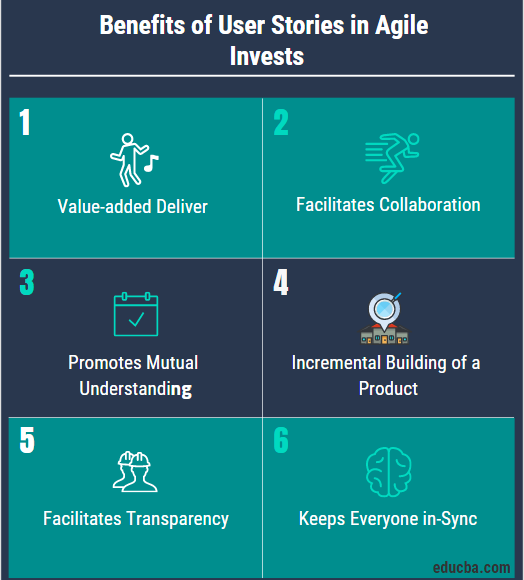What Does Invest Stand for in Agile
What Does Invest Stand for in Agile

Introduction to Agile Invest
'User stories' are the nucleus of the agile methodology, as the team relies on them for the developments or increments in a product. It becomes paramount to get these user stories right. Bill Wake, was the pioneer to have coined the acronym 'INVEST' in his book 'Xtreme Programming'. The Agile Invest framework comprises of attributes contributing to good quality user stories. Agile Invest stands for 'Independent', 'Negotiable', 'Valuable', 'Estimable', 'Small' and 'Testable'.
What are the Benefits of good User Stories in Agile Invest?
The benefits of good User Stories are highlighted below:

1. Value-added Delivery
The traditional Waterfall method focuses on a single task for months without delivering anything of immediate value to the customers. However, the agile user stories are a set of smaller tasks based on customer requirements and necessities, delivered within a few days. The user stories focus on customer satisfaction and continually upgrade the product as per the customer requirements.
2. Facilitates Collaboration
Conventionally, the Waterfall method relied solely on pre-defined, documented instructions and tools. While in Agile, the development team allies with the user to deliver products as per their expectations by encouraging feedback and communication. Thus, the agile user stories are defined based on continual customer feedback, unlike the instruction-led documentation.
3. Promotes Mutual Understanding
As the Agile teams focus on delivering quality to the customers, with every user story, the team members are in continual contact with the users. Minimum documentation also results in routine discussions with the User. It enables the development team to receive feedback on User stories as they get implemented. Thus, this promotes mutual understanding between the development team and users, which enables them to collaboratively design, upgrade, and break the user stories.
4. Incremental Building of a Product
As the customers are the key contributors to the User Stories, the continual feedback results in a gradual and incremental development of a product. This incremental fashion of work enables to make changes in the product. Thus, these smaller sets of User stories allow the developers to remove a redundant feature in a product and upgrade it with a more recent one.
5. Facilitates Transparency
The User stories are collaboratively designed by the development team and the users. These defined user stories are recorded on Index cards which offer visibility to the stakeholders and development team. It results in transparency and strengthens the trust levels between them. Thus, transparency enhances the effectiveness of the teams and helps in eliminating waste from the process.
6. Keeps Everyone in-Sync
Most importantly, User stories are the connecting point between the development team and the business-oriented people, who are not so technically sound. This makes the decision-making process easier as parties from diverse fields are involved.
The above-mentioned benefits of good User stories indicate their importance in Agile methodology. Hence these stories have to be well-framed. The Agile Invest framework puts forward the required attributes that contribute to 'good user stories.'
Detail Understanding of Agile Invest
The Agile Invest framework as outlined below sets standards in designing of a User Story. Let's understand it in a more detailed way:

Let's understand the contributing attributes of the 'Invest' framework in detail:
1. Independent (I)
All the user stories should be self-contained single units and independent of each other. This segregation between each story makes prioritization, evaluation, addition or elimination easier from an iteration. The project team should be able to bifurcate technical interdependencies between the user stories so that each of them can be executed separately. To implement this, the project team is required to be skilled in creative thinking and effective problem resolving techniques.
2. Negotiable (N)
In Agile, a story is not supposed to be an agreement and the crux of the same lies in delivering what the customers desire. The end product should be a result of a collaborative partnership, offering room for negotiation between the customers and the development team. Ultimately, the goal is to meet customer expectations and requirements.
3. Valuable (V)
Each story is required to be of value to the customer (it could be the user or the purchaser). And the best way to do the same is to make the customers compose them. The user stories should be aligned to precise business goals, so as to deliver value.
4. Estimable (E)
If the story is too big, the development team will not be able to understand it, to make an estimation. The story should enable the development team to make a judgment about the complexities of work and the efforts required. This does not necessarily mean that all the acute detailing of execution should be understood for the estimation of a story.
5. Small (S)
As it's known, agile stories are smaller units of work. But what is the expected story size? Ideally, the development team should be able to deliver a unit of work task within 1 Sprint (Single sprint duration – not more than 2 to 4 weeks). The stories which exceed this duration and efforts tend to have errors with estimation.
6. Testable (T)
To go through the confirmation, the story has to be testable. What is the use of developing a product that cannot be tested? And the constructive way to do this is to determine the acceptance criteria of the users for the stories. Thus, following the guidelines of the Agile Invest framework would enable the development teams to design effective User Stories. Such effective development of User stories will not only garner customer satisfaction but will also enable us to deliver business value. Without a well-framed user story, effective implementation and development of a product are not possible. A good user story is a channel for effective product implementation and customer satisfaction.
Recommended Articles
This has been a guide to the Agile Invest. Here we discussed the Concept, Detailed Understanding and Benefits of good User Stories in Agile Invest. You can also go through our other Suggested Articles to learn more –
- What is Agile Programming
- Agile Scrum Interview Questions
- What is Agile Project Management
- Agile vs Waterfall
Source: https://www.educba.com/agile-invest/
Posted by: paschketund1953.blogspot.com
0 Response to "What Does Invest Stand for in Agile"
Post a Comment